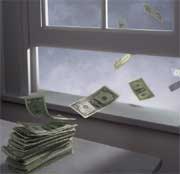 Cia.gov (don't ask) has posted a ranking of the world's national government account balances - that is, countries with the actual gold and cash on hand and in-vault to back their debt pending. And uh, well, guess who is ABSOLUTE LAST? Yep, United States ranks 150th and well over-drafted at $-829,100,000,000 (yes, that is NEGATIVE). In simple terms, we got a hellava overdraft fee piling up, and all the "checks" we're writing are the least coverable if all nations were forced to ante up the dough tomorrow.
Cia.gov (don't ask) has posted a ranking of the world's national government account balances - that is, countries with the actual gold and cash on hand and in-vault to back their debt pending. And uh, well, guess who is ABSOLUTE LAST? Yep, United States ranks 150th and well over-drafted at $-829,100,000,000 (yes, that is NEGATIVE). In simple terms, we got a hellava overdraft fee piling up, and all the "checks" we're writing are the least coverable if all nations were forced to ante up the dough tomorrow.
Japan tops the list with highest balances at 165,600,000,000, China at no. 2 with $ 160,800,000,000, Germany $ 115,500,000,000, Saudi Arabia $ 90,730,000,000 and Russia comes in 5th $ 84,250,000,000. Essentially, the whole planet comes in at balance and less overdrawn than our nation.
Joining us in the bottom five overdraft club are the western empires France, Australia, UK, and Spain.
But it gets better. According to the US Federal Reserve, total foreign ownership of US Federal deficit currently stands at 45% as of end of first half of 2005.
Consider the COUNTRY OWNERSHIP OF OUR U.S. GOVERNMENT DEBT
Japan $687.3Billion
China $252.2 Billion
United Kingdom $182.4 Billion
Caribbean Banking Centers $102.9 Billion
Taiwan $71.8 Billion
Germany $63.5 Billion
Korea $61.7 Billion
OPEC $54.6 Billion
Hong Kong $48.1 Billion
Canada $47.8 Billion
Grand Total $2,065.5 Billion
Conclusions:
* Foreign sources financed 54% of US Federal deficit in 2002, 73% in 2003, and 99% in 2004
* Total foreign ownership of US Federal deficit currently stands at 45% as of end of 1st half of 2005
* The US Government currently owes Japan $687 Billion, China $252 Billion, and Korea $62 Billion - together $1.0 Trillion
* The US Government currently owes $2.0 Trillion to foreign lenders
And those lenders we owe, ironically, turn out to be the most balanced managers of their dough.
What's true of individual Americans is true of American government.
Share ideas that inspire. FALLON PLANNERS (and co-conspirators) are freely invited to post trends, commentary, obscure ephemera and insightful rants regarding the experience of branding.
Sunday, September 17, 2006
Trend: Bankrupt!: National Overdraft
Subscribe to:
Post Comments (Atom)















1 comment:
If the American property market collapses, which most economists are reluctant to use as an hypothesis for self preservation reasons, it's going to be an interesting time.
Post a Comment